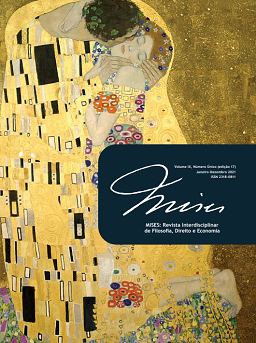A Liberal Interpretation of Moby Dick
DOI:
https://doi.org/10.30800/mises.2021.v9.1389Keywords:
American Revolution, liberal values, Herman Melville, Moby DickAbstract
The essay offers an economic interpretation of Herman Melville's Moby Dick. Its central thesis is that the cetacean represents, in an emblematic way, the values that conditioned the birth of the United States as a nation. To carry out the endeavor, the paper places the book in the historical context, describes the literary revolution that haunted this nation, and Moby Dick's place in the movement. This essay examines some key passages in the adventure story that support the interpretation, especially chapters 42 and 54 of the work. We seek to unravel the main subliminal messages of the book. The heart of the book is identified in terms of the values it affirms, offering a liberal interpretation of the message of the book, associating the creature protagonist of the work with justice.
Downloads
References
BALDWIN, Stanley P. On Melville’s Moby-Dick. Boston. New York: Houghton Mifflin Harcourt, 1999.
BARTLEBY RESEARCH. Moby Dick and Don Quixote as Self-Conscious Novels Essay. Bartleby Research, s/d. Disponível em: https://www.bartleby.com/essay/Moby-Dick-and-Don-Quixote-as-Self-FKKYDUAVC. Acesso em: 10 fev 2021.
BIBLIOTEK. The Origin of “Moby Dick”. Biblioklept, 2011. Disponível em: https://biblioklept.org/2011/09/26/the-origin-of-moby-dick/. Acessado em: 10 fev 2021.
BREWSTER, David. Lives of the Most Eminent Literary and Scientific Men of Italy, Spain, and Portugal, London: Longman, Rees, Orme, Brown, Green & Longman, 1837.
BUELL, Lawrence. Moby Dick as Sacred Text. In: New Essays on Moby Dick. Cambridge: Cambridge University Press, 1986.
FEIJÓ, Ricardo L. C. The origins of anti-capitalism in the young Marx. Brazilian Journal of Political Economy, v. 39, n. 4, 2019.
GAMBAROTTO, Bruno. Modernidade e mistificação em Moby-Dick, de Herman Melville. Tese de doutorado. Orientador: Jorge Mattos Brito de Almeida. Ano da defesa: 2012. Número de folhas: 287. Universidade de São Paulo, FFLCH/Departamento de Letras. Programa em Teoria Literária e Literatura Comparada, São Paulo, 2012.
GREENEM, Jack P. The Social Origins of the American Revolution. An Evaluation and an Interpretation, Political Science Quarterly, v. 58, n.1, 1973.
HAYEK, Friedrich A. von. Direito, legislação e Liberdade: uma nova formulação dos princípios liberais de justiça e economia política. Rio de Janeiro: Visão, 1985.
HUGHES, Rowland. Nineteenth Century American Literature, Hertfordshire: Pearson Longman, 2011.
HUSBAND, Julie. Antislavery Discourse and Nineteenth-Century American Literature. Boston: Palgrave Macmillan, 2010.
LAWRENCE, David H. Herman Melville’s Moby Dick. In: Studies in Classic American Literature. Cambridge: Cambridge University Press, 2003.
MARRS, Cody. Nineteenth-Century American Literature and the Long Civil War. Cambridge Studies in American Literature and Culture, Cambridge, New York: Cambridge University Press, 2015.
MARTIN, James K. Men in rebellion: Higher governmental leaders and the coming of the American Revolution. New Brunswick: Rutgers University Press, 1973.
MELVILLE, Herman. Moby Dick or the Whale. Nova Iorque: Random House, 1930.
MELVILLE, Herman. Moby Dick. São Paulo: Nova Cultural, 2005(a).
MELVILLE, Herman. Moby Dick - Clássicos Ilustrados. São Paulo: Companhia Editora Nacional, 2005(b).
MELVILLE, Herman. Moby Dick. São Paulo: Cosac & Naify, 2008.
MELVILLE, Herman. Moby Dick. Rio de Janeiro: Nova Fronteira, 2017.
MYERS, Henry A. Captain Ahab’s Discovery: The Tragic Meaning of Moby Dick. The New England Quarterly, v. 15, n. 1, 1942.
OLSON, Charles. Call Me Ishmael: A Study of Melville. London: Jonathan Cape, 1947.
PERSON, Leland S. Bibliographical Essay: Hawthorne and History. In: A Historical Guide to Nathaniel Hawthorne, Oxford: Oxford University Press, 2001.
PHILBRICK, Nathaniel. No Coração do Mar - A Tragédia do Baleeiro Essex. Queluz de Baixo (Portugal): Editorial Presença, 2015.
REYNOLDS, Jeremiah N. Mocha Dick: Or the White Whale of the Pacific. London, Glasgow: Cameron and Ferguson, 1870 [1839].
RUGGIERO, Vincenzo. Moby Dick and the crimes of the economy. British Journal of Criminology, v. 42, n. 1, 2002.
SPROUL, Robert C. The Unholy Pursuit of God in Moby Dick. Published by the Ligonier Ministries on August 1, 2011. Disponível em: https://www.ligonier.org/learn/articles/unholy-pursuit-god-moby-dick/. Acessado em: 20 maio 2021.
STUDY. Moby Dick as a Symbol of God. Study.com, s/d. Disponível em: https://study.com/academy/lesson/moby-dick-as-a-symbol-of-god.html. Acessado em: 10 fev 2021.
STUDY. White Whale in Moby-Dick: Symbolism, Meaning & Metaphor. Published by Study.com, s/d. Disponível em: https://study.com/academy/lesson/white-whale-in-moby-dick-symbolism-meaning-metaphor.html. Acessado em: 10 fev 2021.
THE ARTIFICE. Moby Dick: Ahab’s Word Against the World’s. The Artifice, s/d. Disponível em: https://theartifice.com/moby-dick-ahabs-word-against-the-worlds/. Acessado em: 10 fev 2021.
THE GUARDIAN. The Knight in the Mirror. The Guardian, 2003. Disponível em: https: //www.theguardian.com/books/2003/dec/13/classics.miguelcervantes. Acessado em: 10 fev 2021.
Downloads
Published
How to Cite
Issue
Section
License
Copyright (c) 2021 MISES: Interdisciplinary Journal of Philosophy, Law and Economics

This work is licensed under a Creative Commons Attribution 4.0 International License.

This Journal is licensed under a Creative Commons Attribution 4.0 International License.


















